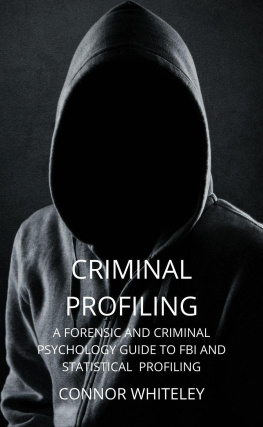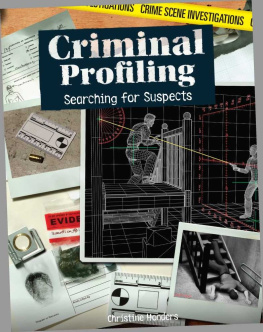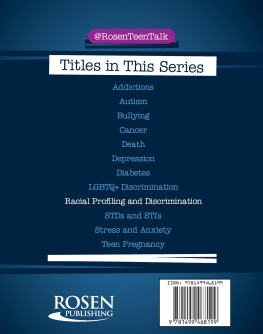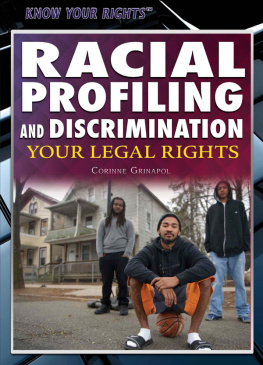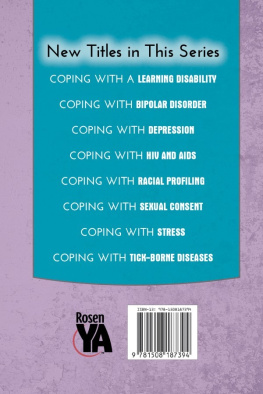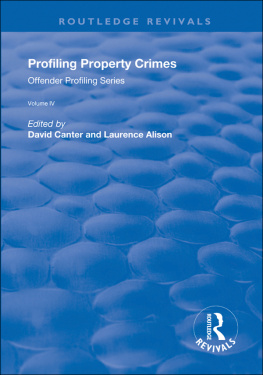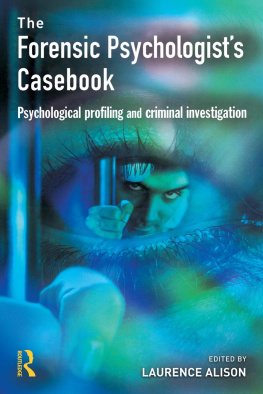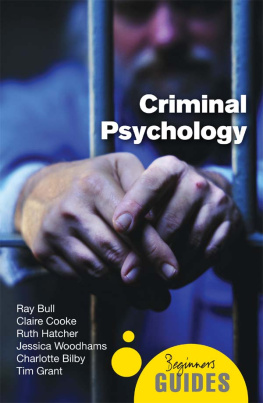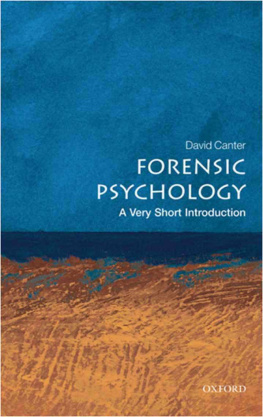Criminal Profiling: A Forensic and Criminal Psychology Guide To FBI And Statistical Profiling
An Introductory Series, Volume 27
Connor Whiteley
Published by CGD Publishing, 2021.
CRIMINAL PROFILING
A FORENSIC AND CRIMINAL PSYCHOLOGY GUIDE TO FBI AND STATISTICAL PROFILING
CONNOR WHITELEY
No part of this book may be reproduced in any form or by any electronic or mechanical means. Including information storage, and retrieval systems, without written permission from the author except for the use of brief quotations in a book review.
This book is NOT legal, professional, medical, financial or any type of official advice.
Any questions about the book, rights licensing, or to contact the author, please email
Copyright 2021 CONNOR WHITELEY
All rights reserved.
ACKNOWLEDGMENTS
Thank you to all my readers without you I couldnt do what I love.
W henever people think about psychology, they always think of criminal profiling.
If you watch a TV programme or movie about psychology, there is always a criminal profiler who can make amazing predictions based on tiny amounts of data.
This is all a lie.
I wasnt going to be that blunt in the introduction but if you love criminal profiling and you want to be an FBI profiler in your career. Please do not read this book. This book will only tell you what the research says about profiling and how good or bad it is.
If you want a book that will say profiling is the most amazing thing ever and its perfect. Please read another book.
However, if you want a book that explains what profiling is, how FBI profiling actually works and how useful it is in the real world and more. Then this IS the book for you.
Who Is This Book For?
If youre a psychology student, a trained psychologist professional or a person interested in forensic psychology. This is the book for you.
If you want a great engaging book that explains profiling in an easy-to-understand way. Then you will enjoy this book.
Also, this book is popular with people who want to learn more about profiling. Since this book isnt a hyped up book on profiling like so many others. And this book doesnt feed into the stereotypical profiling you see on TV, movies or in fiction books.
This is an engaging, conversational book on what are the two types of profiling, how effective are they and much more.
Who Am I?
I always like to know who the book is by that Im reading because I like the book is written by a person who knows what theyre talking about.
In case, youll like me, Im Connor Whiteley, an author of 15 psychology books as of March 2021.
Also, Im the host of the weekly The Psychology World Podcast available on all major podcast apps. Each week I discuss the latest psychology news and an interesting psychology topic.
Finally, I am a psychology student at the University of Kent, England and later in 2021, Ill be working with a group of university researchers on two research projects.
So, now the introduction is done, lets see what Profiling is really about...
1.1- INTRODUCTION TO FBI PROFILING
W elcome to the first type of profiling, well be looking at in the book. This is the style of profiling that has been adorned and made famous by Hollywood, TV and movies all over the world.
However, like most things in TV and movies they get it wrong. So, lets look at what real FBI profiling is like.
Overall, profiling as practised by the FBI has failed to convince many psychologists of its effectiveness and this is the focus of the book, or at least this first part.
Generally, profiling is about predicting the characteristics of offenders.
I think this sounds great because it would be useful to know what characteristics the police need to look for. Since this would save the police time, money, and resources. Yet the truth is far from that simple.
Profiling as A Broad Term:
If I asked you What is Profiling? what would you say?
Chances are you would say its what they do on TV. And you would be right and wrong.
Due to a lot of profilers dont understand the board term of profiling. This is only reinforced by Horant and Kennedy (1998) who defined the following 3 types of profiles and these should be carefully separated.
Firstly, you have whats known as crime scene profiling. This is where profilers use information from the crime scene to create a full picture of the unknown offender. Like, physical evidence.
Secondly, you have offender profiling. This is probably the type of profiling you see on TV and in movies. Where the profilers use a collection of empirical data to collate a picture of the characteristics of the offenders in a particular type of crime.
The final type of profiling is whats known as psychological profiling. I know a lot of people think this is the only think psychology does, but it isnt. Since this is a type of profiling where profilers use standard personality questionnaires and interviews to determine if the person matches the known personality of a certain type of offender.
Therefore, there is absolutely no surprise that theres confusion about profiling. Especially, when we consider how board profiling can be.
Viewpoints in Profiling:
As I write this book and Im only on the third page, I had no idea I was going to be this passionate about the topic. But I might as well continue.
So, in profiling, there are two opposing viewpoints about what profiling should be. The first viewpoint is profiling is akin to clinical judgement which is informed by research but ultimately subjective. Due to the psychologist uses their expert opinion and the data to create the profile. This is what the FBI style of profiling uses.
Although, I need to say because my main background is in clinical psychology. There is a massive difference between clinical judgement and profiling. In clinical judgement, a psychotherapist uses a strong research base to inform their decisions. And as well see later in the book, FBI profiling could be considered lacking in its research base.
In addition, in an area in clinical psychology called: Formulation. A psychotherapist would work with a client to create the clinical judgement. Thats the simplified version because the client (mental health sufferer) brings the expertise in themselves. Whereas in FBI profiling you cannot work with an offender to create their profile because you often dont know who the offender is.

